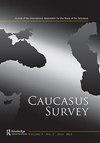Constructing sites of memory and practising nationalism beyond the homeland: Georgian migrants in the USA and Germany
IF 0.4
Q3 AREA STUDIES
引用次数: 0
Abstract
ABSTRACT The article deals with constructing and/or reproducing sites of national memory and cultural heritage among Georgian immigrant communities in the USA (New York City) and Germany (Berlin and Regensburg). Georgian immigrant communities in the USA and Germany consist of “old” and “new” arrivals, with people of various ages as well as different professional and employment backgrounds. We try to address the questions: how do socio-economic challenges, legal immigration status, job opportunities and living conditions influence immigrants’ attitudes toward national identity and culture? How do plans to stay and integrate into host societies define the ways immigrants “practice” nationalism? The symbolic realm of Georgian immigrant communities in the USA and Germany consists of both tangible and intangible sites of national identity and memory, as well as cultural heritage. We reflect on how national identity is “crystalized” and represented in material and physical settings (churches, and icon corners at home, for instance) and in certain national, cultural, and religious practices. These practices as cultural expressions manifest in preserving the native language, adhering to the Christian faith, celebrating Orthodox Christian holidays, learning national songs and dances, maintaining traditional cuisine, and eating habits, and more.在祖国之外建造记忆场所和实践民族主义:美国和德国的格鲁吉亚移民
摘要本文涉及在美国(纽约市)和德国(柏林和雷根斯堡)的格鲁吉亚移民社区中建造和/或复制国家记忆和文化遗产遗址。美国和德国的格鲁吉亚移民社区由“老”和“新”移民组成,他们的年龄不同,专业和就业背景也不同。我们试图解决以下问题:社会经济挑战、合法移民身份、工作机会和生活条件如何影响移民对国家身份和文化的态度?留下来并融入东道国社会的计划如何定义移民“实践”民族主义的方式?美国和德国格鲁吉亚移民社区的象征性领域包括具有国家身份和记忆的有形和无形遗址以及文化遗产。我们反思国家身份是如何在物质和物理环境(例如教堂和家里的图标角落)以及某些国家、文化和宗教实践中“结晶”和表现的。这些做法作为文化表现形式体现在保护母语、坚持基督教信仰、庆祝东正教节日、学习民族歌舞、保持传统美食和饮食习惯等方面。
本文章由计算机程序翻译,如有差异,请以英文原文为准。
求助全文
约1分钟内获得全文
求助全文
来源期刊

Caucasus Survey
Arts and Humanities-History
CiteScore
1.30
自引率
9.10%
发文量
4
期刊介绍:
Caucasus Survey is a new peer-reviewed, multidisciplinary and independent journal, concerned with the study of the Caucasus – the independent republics of Armenia, Azerbaijan and Georgia, de facto entities in the area and the North Caucasian republics and regions of the Russian Federation. Also covered are issues relating to the Republic of Kalmykia, Crimea, the Cossacks, Nogays, and Caucasian diasporas. Caucasus Survey aims to advance an area studies tradition in the humanities and social sciences about and from the Caucasus, connecting this tradition with core disciplinary concerns in the fields of history, political science, sociology, anthropology, cultural and religious studies, economics, political geography and demography, security, war and peace studies, and social psychology. Research enhancing understanding of the region’s conflicts and relations between the Russian Federation and the Caucasus, internationally and domestically with regard to the North Caucasus, features high in our concerns.
 求助内容:
求助内容: 应助结果提醒方式:
应助结果提醒方式:


